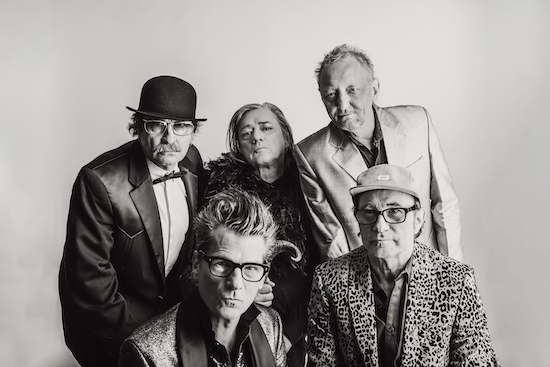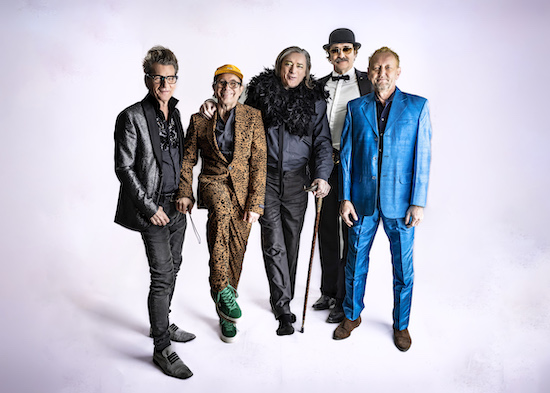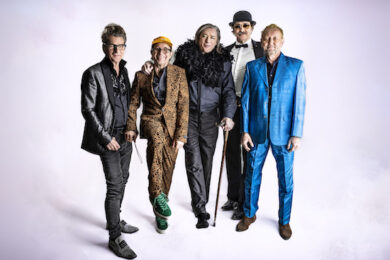“In another solar system, Einstürzende Neubauten would be as famous as The Beatles are in ours,” says Blixa Bargeld from his penthouse apartment in East Berlin. Bargeld is back living in the city for the first time in over a decade after stints in San Francisco and Beijing. We’re talking about the new Einstürzende Neubauten record RAMPEN (APM: Alien Pop Music), a double album that manages to contain every facet of the band’s varied history, while still finding new sonic ground to break. It’s not the only time in our conversation Bargeld mentions The Beatles, specifically the ‘White Album’, their sprawling genre agnostic 1968 record. Neubauten have always resisted easy categorisation, so it seems apposite they should, at this stage of their career, create one of their own. “At first I wasn’t sure if calling the new album RAMPEN was such a good idea,” says Bargeld, “Which is why I gave it that subtitle, "Alien Pop Music", inventing a new genre, APM. Don’t let pop music be given popularism by the majority – there is a minority pop music. Pop music for the different girls, pop music for the different boys, pop music for the aliens.”
Playful pop for an alien audience may not be how Neubauten are generally perceived, but it’s been a long time since a stick-thin Bargeld could be found bound in leather screaming over a battery of home-made instruments and sheet-metal percussion. Yet the idea that Neubauten started as loud, aggressive and sometimes violent collective, and have progressively gotten tamer and safer is a falsehood. From their earliest releases the band have always balanced the noise and din with hushed moods and ambience. In fact, it is the tension between the two states that Neubauten should be best known for. Yet the image of a bunch of speed freaks using angle grinders, electric drills and cement mixers to destroy stages around the world persists. The fact that they’re still using them – albeit in more subtle and textured ways – appears to be lost on those who hark back to their early years.
“We only had the cement mixer at the ICA,” says Bargeld, referencing their legendary show at the London venue in 1984, “But everything else we never really stopped using. We still carry the same shit around with us as we did in the mid-80s.”
It’s this ‘same shit’ that shapes the new album, as most of the tracks were worked up on the 2022 tour in support of the Alles In Allem album (2020). The band would regularly encore with an improvisation – or ‘rampen’ in Neubauten parlance – which was recorded as a potential jumping off point for future material.
“In the very beginning, we would only improvise on stage, since we had no other material,” says Bargeld. “Of course, with a growing catalogue of releases, we could actually build a set and play songs more than one time. To this day, we always keep a part on the set where we say, OK we’re going to make an improvisation. But the whole technique goes back in Neubauten for very long time. I think the first rampen we rerecorded in the studio was ‘Letztes Biest (Am Himmel)’ from Halber Mensch (1985).”
From the 2022 tour the band found themselves with around 25 recordings, and chose 15 that had the most potential, then rerecorded them live at Berlin’s Candy Bomber Studio with producer and sound engineer Ingo Krauss. The origins of the material meant the album was recorded quickly. “Normally, a lot of studio time is spent on research; looking for new sounds, finding what else we can use. But because everything was based on live improvisations, we already knew what the pieces were played on. We did overdubs and other things as well, but generally we worked with the instruments that we had with us on tour.”
A similar process was undertaken for the lyrics, with Bargeld loading his live teleprompter with written fragments that could be tried out as each rampen unfolded live on stage.
“I am in the discipline of writing something every day, so my computer is full of things that could possibly be musicalised. And I used a different set of those fragments every couple of shows. The oldest fragment on the record is probably ‘Aus den Zeiten’, where I’m singing about the colour yellow, which I originally wrote in Beijing around 2004. The newest is ‘Gesundbrunnen’ that I wrote only a couple of weeks before the tour. That fragment described the underside of a particular ugly carpet.”
Ah, the Neubauten sense of humour. Another misconception about the band is that they’re humourless and overly serious. Bargeld sighs. “The dry wit has been overlooked in Neubauten for a long time,” he says. “We are taken far too seriously. Maybe it’s because we’re German, I don’t know. But it’s not just outside of Germany, it’s overlooked here too.”
Such ‘dry wit’ runs through the new album, as does a certain mischievousness. When the French chanson singer Patricia Kaas asked Bargeld to write a duet for her, he decided to pen the ultimate break-up song. “I thought the most minimalist break up song would be, ‘You without me, me without you – that’s better!’” he says. “I sent it to her, but she never recorded it. So when we were doing the rampen at the show in Paris, I thought maybe Patricia might be in the audience, so I used the lyrics there. I don’t know if she was present, but it developed into ‘Besser Isses’ on the album, which now sounds more like I’m breaking up with God and the universe.”
On another track, ‘Pestalozzi’, the lyric concerns AS Neill, the Scottish advocate for educational reform. A deeper reading of this though, isn’t necessary. “What triggered it in my mind was a photo of AS Neill sitting in his armchair, and all around him children are creating chaos,” says Bargeld. “And that’s how I felt at the time, "a little AS Neill". But after that, the words are basically items from my Amazon purchase history.” Bamboo skewers, a nebuliser, quail egg scissors, and A Cellarful Of Noise? “It’s the autobiography of Brian Epstein, the one that John Lennon joked should be called A Cellarful of Boys!”
The Beatles again. It would seem that for RAMPEN (APM: Alien Pop Music) the Fab Four are something of a touchstone. “N.U. Unruh is the biggest Beatles fan under the heavens”, says Bargeld. “His idea was we call the album Gelb [yellow]. And I just thought maybe we just make it like the ‘White Album’ but make it yellow. So, it’s done in the same way: it’s a double album, with the embossed writing, a poster inside and photos of the individual members, and a number on the back. So it is clearly a reference. And clearly a joke also.”
RAMPEN is released on the band’s own Potomak label, the imprint the band have been using since 1988. After working with a variety of record labels, including Rough Trade, Mute and Some Bizzare (“He [label boss Stevo Pearce] still fucks us. But I will fuck him back, don’t worry. I have some things that will make him really angry!”), the Berlin quintet have been resolutely independent, funding the recording and production of their albums via their Supporter Project, which was developed by Bargeld’s wife, the mathematician Erin Zhu.
“After the record industry crashed completely in 2000 or 2001, if we’d have gone out shopping for a new record contract we would have got the same money we used to get for the sleeve to make the entire album. And we can’t work like that. We need to all be in a studio together and do multiple takes until we get the piece. And with that dinosaur way of working you need the time, the space, the studio – you don’t do it in front of a computer by moving little colourful blocks on a screen. So, in many ways,” he adds, returning to his theme, “It’s not just in a parallel universe we are The Beatles, it’s in this one too.”
But after five phases of the Supporter Project, Neubauten have called time with an event which was held over the Easter weekend. Supporters from all around the world gathered in Berlin for a guided bus tour of the city with Bargeld as the host, a walking tour of band-related haunts with Alexander Hacke, and Jochen Arbeit displaying a selection of his homemade instruments, as well as witnessing a rampen unique to the event. While it may be the end of this iteration of the Supporter Project, the band won’t be looking to sign to a record label anytime soon. “My wife is now working on a completely new version to finance and make our work possible,” says Bargeld. “I can’t give you many details yet but it will be something revolutionary and completely new again.”

Neubauten have always been intrinsically linked to Berlin. Their first album Stahlmusic (1980) was recorded in a pillar of the Stadtautobahn Bridge, and before the wall came down in 1989 bands such as Malaria!, Die Tödliche Doris and Mania D, along with Neubauten, created an alternative ecosystem that was unique and uncorrupted by outside media. These were the days of the Risiko bar (where Bargeld worked), the Kreuzberg squats, and the Geniale Dilletanten movement.
“In the beginning I was living under the impression that what we were doing back then was possible in any kind of urban setting,” says Bargeld, “But playing live widened our horizons, especially cities in like London, Paris, and New York, and I realised that wasn’t true. The West Berlin DNA was certainly unique.”
Bargeld may be back in Berlin, but his home is now in the east of the city, not the west. “The city I used to live in does not exist an anymore, and to a certain extent Berlin is new city for me. In the 80s I visited [playwright] Heiner Müller in East Berlin a couple of times, but really, I have no memories connected to here – I can leave the house and go to places I’ve never been to in my life. Of course, if I go through the Tiergarten tunnel back to West Berlin, I can tell you about my first girlfriend and my dentist and everything. But here there is nothing.”
What is also new for Bargeld is the slow creep of the far right on his country’s political landscape. The situation is addressed on the new record. “’On Everything Will Be Fine’ you will hear my cynical point,” he says. “I did it in a stream of consciousness when suffering with insomnia following breaking my femur. I did about six takes, everything that I mumbled was different, and when I tried to transcribe it, I could only work out a few sentences. I wrote the final lyrics after watching the eight o’clock news on the 8 October [the date of the Bavarian State Elections where there was a surge in popularity for the far right AfD party] with my wife, who is Chinese. Our children are half-Chinese, and we reflected, ‘Where should we go now?’ We got the message and seriously we have to think about where are we gonna go? It’s as sad and deep as that.”
As such, the playfulness of RAMPEN should not be mistaken as triviality. The lightness of touch Bargeld and the band display on the new record does not belie the seriousness of the subjects they interrogate, nor the songs’ sincerity. “I have a trans son,” says Bargeld, “And there was a song on Alles In Allem, ‘Seven Screws’, where I make a connection between psychology and Greek mythology, particularly the death of Hercules, who got burned by wearing a dress. It was written before my son came out and ends with the word ‘nonbinary’ repeated.”

The theme is continued on the new record with the closing two tracks, ‘Trilobiten’ and ‘Gesundbrunnen’. Bargeld was given a fossilised trilobite by Myra Davies, the organiser of the Vancouver Expo which Neubauten played in 1986, on a bill that also included the Indian Dancers of the Northern Territories and Youssou N’Dour. (“Isn’t that an evening you’d like to see?”) “The trilobite comes from the time before there was gender, so that’s the root of that song’s lyrics: ‘Me you me you me you / Still undivided.’ And that flows into ‘Gesundbrunnen’, which was the most difficult piece to write. I’m clearly stating, ‘I opened a door where there wasn’t a door before’ and that door is of course the escape from biological determinism. Now my son is out, I am reading the literature that it is necessary to read – Paul B Preciado if you want to know where the most radical ideas are. And I come to solution – I open a door that wasn’t there before and kick out evolution. Not kick out the jams, motherfuckers, but kick out evolution!”
Comparing themselves to The Beatles and inventing their own genre of music probably wasn’t how many people would have predicted Einstürzende Neubauten enter their fifth decade. Yet here they are, forging ahead sonically, embracing new ideas, using every tool – literal and otherwise – at their disposal. The atonal and the tuneful, the tension and the release, the playful and the profound, it’s all on RAMPEN (APM: Alien Pop Music).
But what is to be made of the brightly-coloured suits, glitter eyeshadow and feather boas of their latest press shots? In 2024 do Neubauten exist to entertain us?
“I’ve never wanted to put anything out in the world that is boring,” concludes Bargeld. “All bands love to perform, and I consider myself one of the rare examples of being an avant garde entertainer. But while I can probably live without making another record, I cannot live without the stage.”
Einstürzende Neubauten’s RAMPEN (APM: Alien Pop Music) is released by Potomak on Friday; they play Shepherds Bush Empire on 11 September



